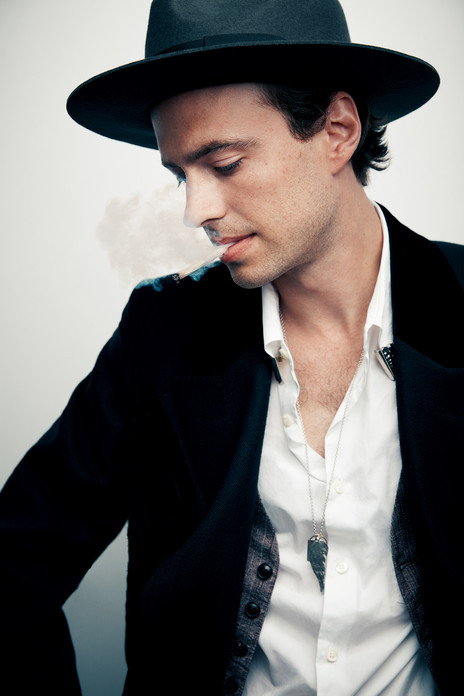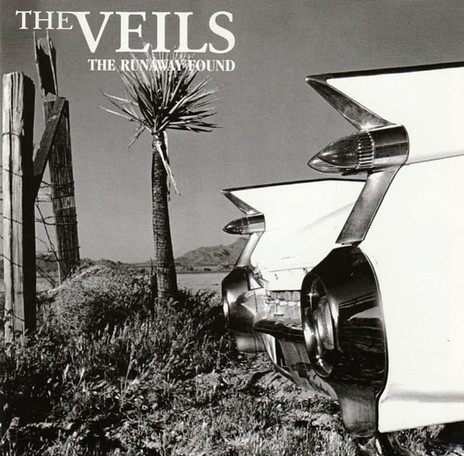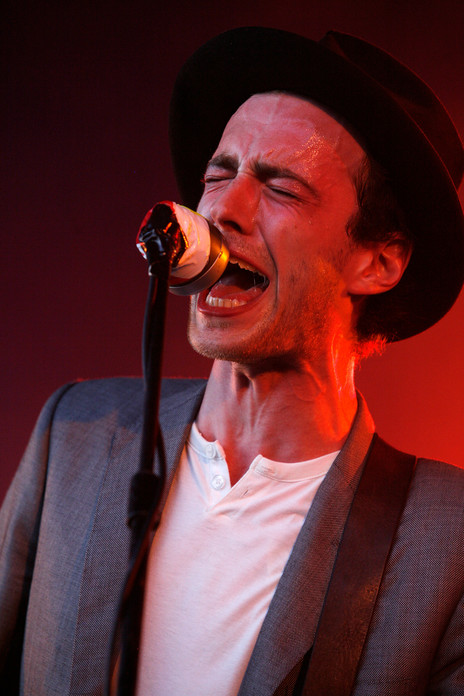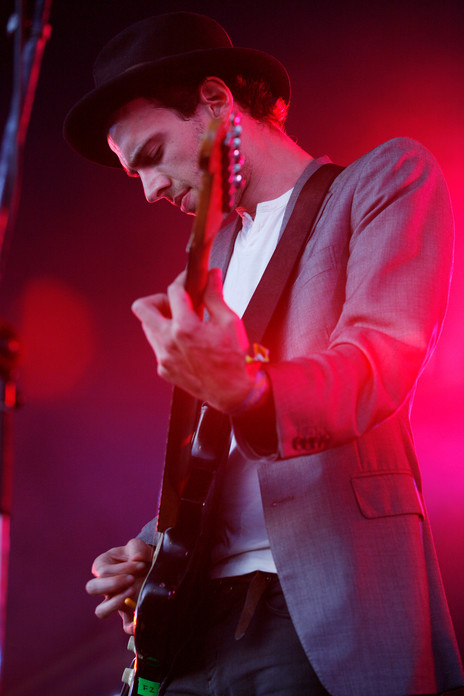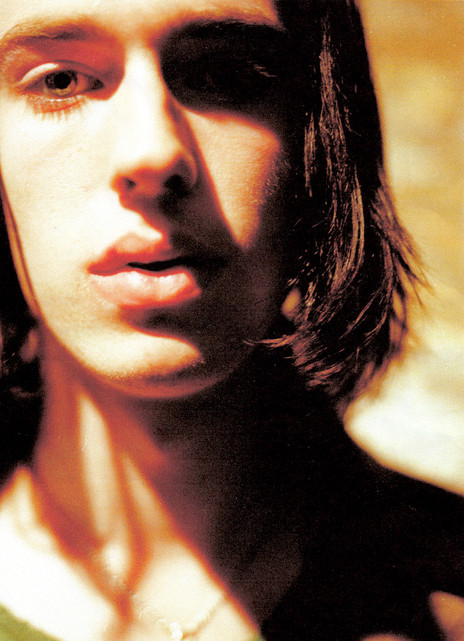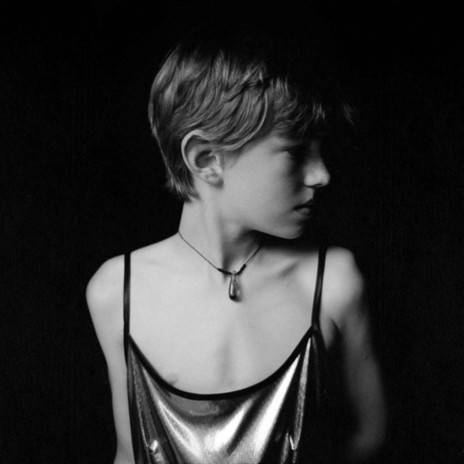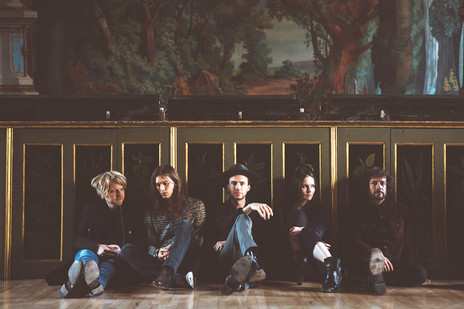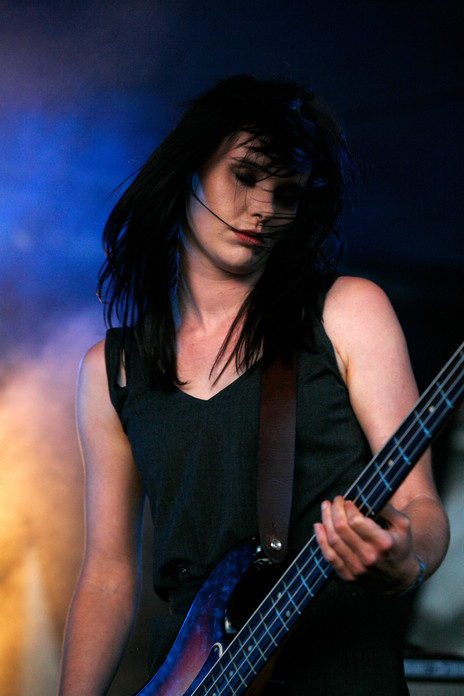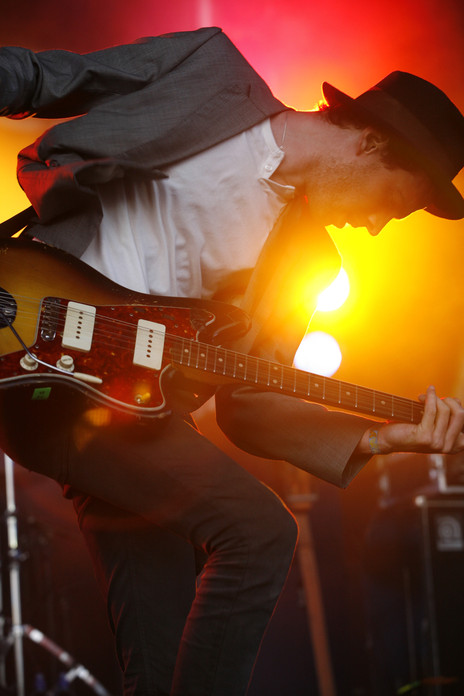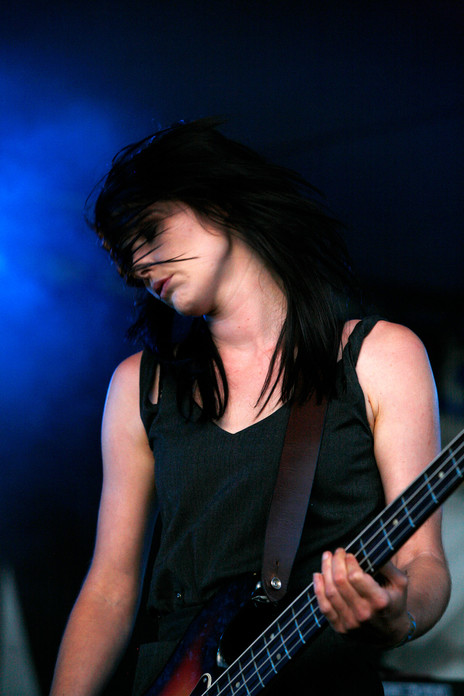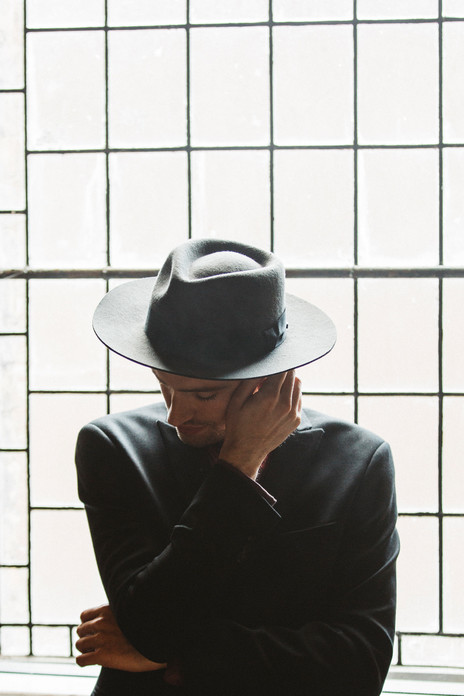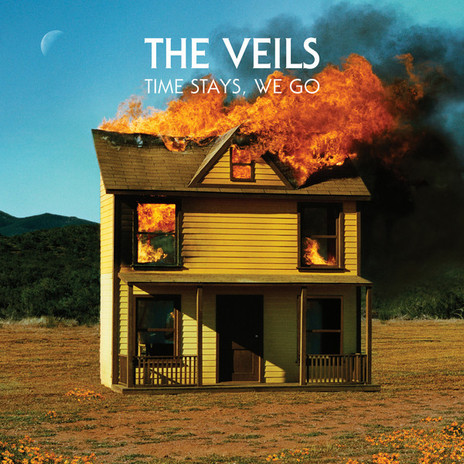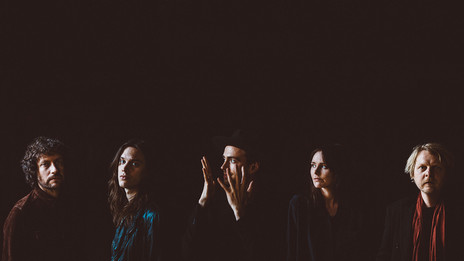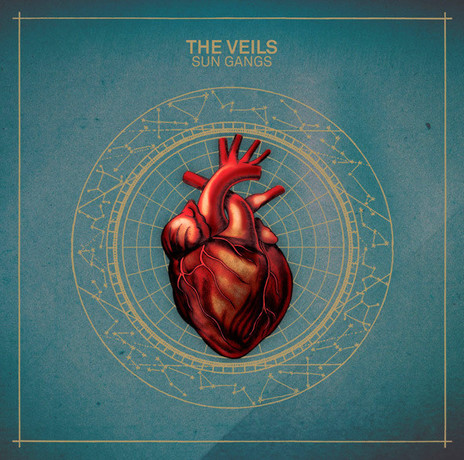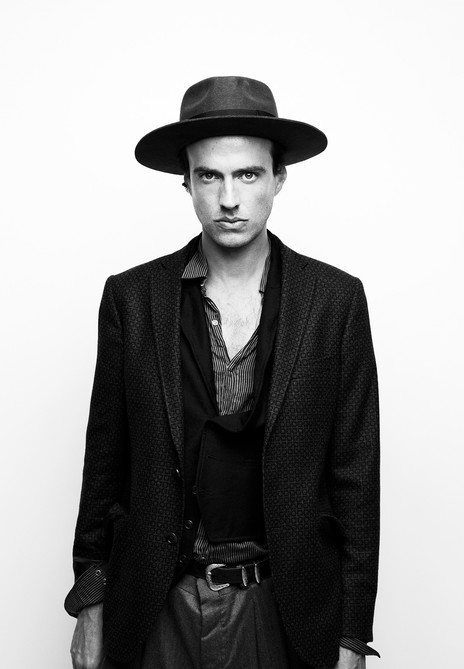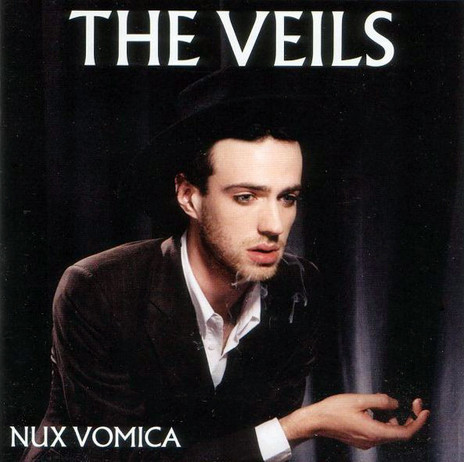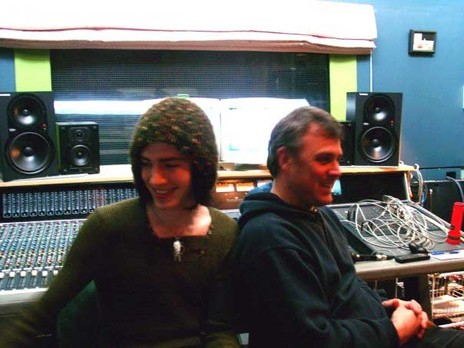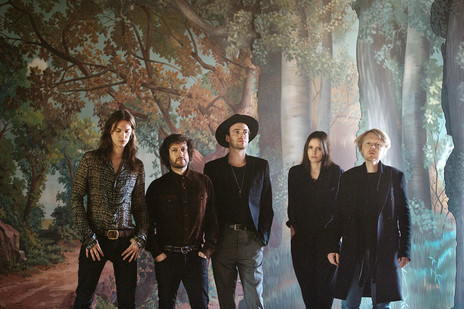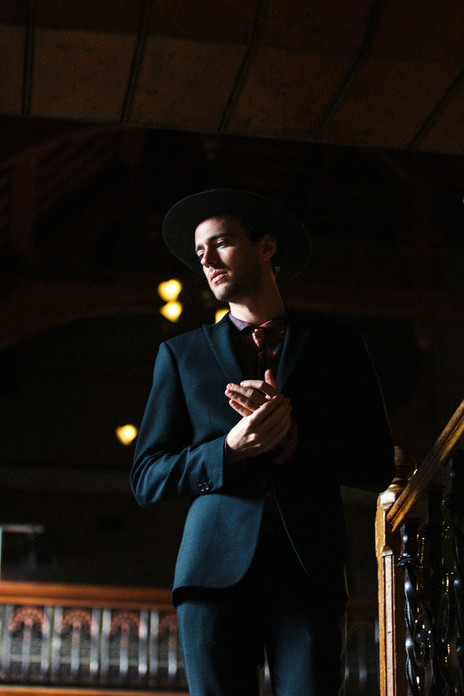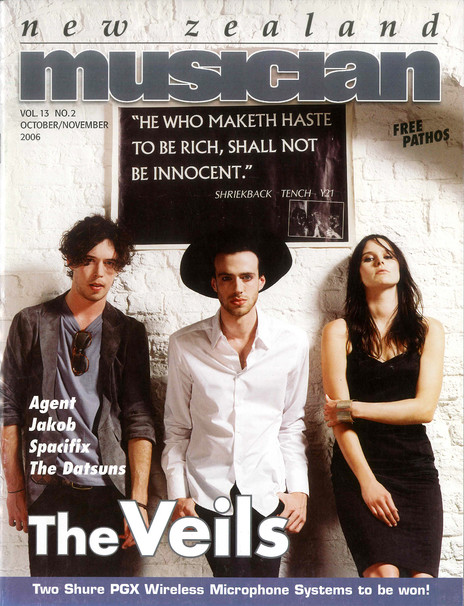Early years
Music and the written word is in Finn Andrews’ blood. His father is Barry Andrews, the British vocalist/keyboardist for XTC, League of Gentlemen and co-founder of Shriekback, while his mother is a professor of English and Sociology. They split when Andrews was a child, his father opting to stay in London, while his mother shifted them to Auckland.
“It’s funny,” reflected Andrews in a 2019 interview with the NZ Herald. “Because of Dad, I didn’t really think music was something I would get into. While I was growing up, everyone I met who played music looked so unwell and it really put me off as a child. It looked hard and a bit sort of dirty and sad and complicated – all the things that don’t seem that attractive as a kid. And it was the thing that took Dad away. It seemed to be this painful, complicated world that I didn’t feel part of. And then I came to Auckland and it felt like something that I could make my own, in some way.”
Eventually he felt the pull to perform, heading at 11 years old to the Devonport Folk Club with his band, playing with his then-girlfriend, a cellist. As a teenager attending Takapuna Grammar, Andrews met his future Veils bandmates, Liam Gerrard and Sophia Burn. Individually, they had all given fame a shot through the time-honoured tradition of Smokefree Rockquest. Gerrard and Burn’s bands didn’t make it past the heats, but Andrews’ band eked into the regional finals.
“We failed Rockquest so miserably,” recalled Andrews in in a 2006 interview with NZ Musician. “We could’ve done alright ... I was onstage, and all the guitars were out of tune. It was my first stage hissy fit; it was a disaster. I ran off and we didn’t get through.”
The judges almost universally panned the performance, except for King Kapisi, “who said – ‘this guy, he’s got something about him’ – that meant so much to me at the time.”
Undeterred, Andrews continued to juggle sets and schoolwork. Eventually, he found out about The Bus, a local recording studio. “I had no idea there were any studios in Devonport, it seemed crazy at the time.”
“I would turn around and expect to see a 30-year-old mature musician and there would be this 16-year-old!” – Rikki Morris
Armed with numerous songs, Andrews knocked on owner Rikki Morris’s door still wearing his school uniform, asking to record some music. “We did a Sunday afternoon demo session,” said Morris in the same interview. “Literally as soon as I heard him sing, I thought ‘Oh my God!’ … he has everything, his whole presence is lovely … he’s a great guitarist and plays beautiful piano. He knows what he wants in the studio … After a time, I was in his hands I guess, and he was very much producing it. I would turn around and expect to see a 30-year-old mature musician and there would be this 16-year-old!”
London calling
Over the next two years, they recorded around 25 songs before Andrews dropped out of his seventh form year to focus on music. A New Zealand-based record company was already courting them, but Andrews eschewed them for the United Kingdom.
“I guess I couldn’t really think of anything else I wanted to do, so I ran away to London when I was 17 and went and started a band. I’d sent the demos I made with Rikki over there to a bunch of labels and they said, ‘Come over and talk to us’, so I did. It was a pretty terrifying time, but it’s good when you’re that age,” said Andrews (NZ Herald, 2019).
In a few short months, those demos had captured the attention of some of the United Kingdom’s top tastemakers. Most notably, Geoff Travis, founder of Rough Trade was a fan. The man responsible for signing The Smiths and a glut of other indie stalwarts was instrumental in getting The Veils their first record deal with Blanco Y Negro, a Warner Bros/Rough Trade partnership.
Looking back at that period of his life, Andrews recalls, “Certainly the dominant feelings of that time are to do with leaving all my friends and family in New Zealand and moving over to London. I think I’d just turned 17 and I really wasn’t all that well equipped to deal with everything coming at me at that time. But it was exciting. It meant a lot that Geoff Travis and Jeannette Lee at Rough Trade saw something in me so early on, and they were both ever-so patient with me as I navigated my way through making that record. Saying that, it was crazy that I made that record when I did, I really didn’t know what the fuck I was doing. We toured all the toilets in Britain several times over and I learned a lot about what it really means to be in a band.”
This was swiftly followed by a promo single ‘Death & Co’, released 19 August 2002. Three months later on 18 November came their commercial debut single, the raggedly impassioned ‘More Heat than Light’. Its flare was tempered by the breathy beauty of their follow-up single ‘The Leavers Dance’, which was sold exclusively at gigs.
In the background, the relationship between Rough Trade and Warner Bros was souring, and The Veils were halfway through their debut album The Runaway Found. “Us and two other bands said we wanted to leave Warner at the same time to go to Rough Trade. That’s the reason why the first album took three years to come out – we were trying to get out of the Warner situation,” recalled Andrews (NZM, 2006). After a lengthy court case, The Veils wrangled their master recordings from Warner Music, finally signing to Rough Trade in 2003.
The Runaway Found
Once they were settled with Rough Trade, The Veils – at that stage comprising Andrews and a session band – were under the wing of Bernard Butler. The former guitarist for Suede was well-versed in gritty glamour and dramatics, a flair he brought to The Veils’ first recordings with the label. ‘Guiding Light’ was released 28 July 2003, followed by ‘Lavinia’ on 24 November and ‘The Wild Son’ on 26 January 2004. This trio of songs eventually formed the opening numbers of The Runaway Found, released 16 February 2004.
“I don’t know how we pulled that off – it was so spread out. I think it was because I wrote the songs in a similar state of mind. There was a real excitement but a real sense of nervousness or nervous energy in there as well – I was finding it strange to be around at that time,” said Andrews (NZM, 2006)
The acclaim was instantaneous and near-universal.
He needn’t have worried about the international press – the acclaim was instantaneous and near-universal. “Veils frontman Finn Andrews doesn’t breathe the same air as the rest of us.” exclaimed The Guardian. “A classy album,” agreed Pitchfork.
Despite the celebration overseas, The Runaway Found failed to make waves in Australasia. Smash Music Management, who were in charge of distributing the album, barely pushed it. “We were signed to a terrible record label in Australia which I think completely stuffed up the first album. Rough Trade took them to court and everything. [The distributor] didn’t actually put it out – he took all this money and didn’t do anything with it but was supposed to be in touch with the New Zealand label as well.” [NZM, 2006].
Understandably disheartened and exhausted, The Veils were fraying. Andrews found himself unhappy with the direction in which the band was going, so they made the decision to split just two months after the release of The Runaway Found. Looking back, Andrews says, “That’s the downside of starting so young – my taste and intention with the band was shifting all the time. I also missed home a lot and had been in London for nearly five years without ever coming back. I was also stubborn, very stubborn, and I really thought nothing good comes out of comfort so I should probably throw a spanner in the works somehow.”
Nux Vomica
Andrews threw in his life in the United Kingdom in 2005, returning to New Zealand via a solo tour of the United States and Japan. “Part of the drive to make Nux Vomica was to put together a band of people from back home. I posted Soph a bass from London and she learned it by the time I got back to Auckland a year later.”
Once on Antipodean soil, Andrews, Liam Gerrard and Sophia Burn reunited and spent the summer rehearsing and shifting the band’s focus, writing an album’s worth of songs in Gerrard’s bedroom. Returning to London refreshed and reinvigorated, the trio were rejoined by Dan Raishbrook (guitar) and Henning Dietz (drums). They headed to Los Angeles in 2006, where they recorded with Nick Launay (Nick Cave and the Bad Seeds, Yeah Yeah Yeahs, Arcade Fire, Talking Heads, Kate Bush).
“As luck would have it, [Nick Launay’s] wife and my mother were friends when I was a kid. In fact, there’s photos of us all on holiday together – Nick is sitting on an inflatable dragon holding me when I was about three years old. So, I’d made some demos in New Zealand and he got a very out-of-the-blue letter from me saying ‘Hi Nick, remember me? I’m old now, will you produce my record?’ He really loved the songs and so we started work on them almost immediately.”
Although just as grandiose as its predecessor, ‘Nux Vomica’ was an ode to gothic Americana.
“Nick changed my whole idea of recording music,” Andrews continues. “I really studied him too, I made notes of every microphone he used and where he put them and took hundreds of photos of the settings on the mixing desk and everything. Honestly, no one makes things sound as good as him. We were also making that record just at the time people stopped giving bands much money to make records, so we had a lot more time than we’ve ever had since. It was a really exciting time. It was also the beginning of my ongoing infatuation with Los Angeles. Nick and Atom had lived there for years so they really knew how to show you a good time. On our first night out, I remember we met a guy claiming to be Heidi Fleiss’s attorney walking round a bar with a cat on his shoulder and I thought I could really get used to this town.”
Although just as grandiose as its predecessor, the resulting album, Nux Vomica, was an ode to gothic Americana. Andrews performed it with a guttural swagger that drew comparisons to Nick Cave.
“I feel like everyone was feeling a collective sense of existential dread around that time,” says Andrews when asked about his songwriting on the album. “I remember Dubya Bush had just got in [as US President] and I was feeling like everything was doomed. That seems so quaint now, doesn’t it?
“I had no idea how much worse things would get. There was a very real sense of the fundamentalist Christians running America and therefore the world at that time in particular, and I think a lot of the songs are a bit of a reaction to that, as well as my own brimming little anxiety disorder.”
The single ‘Advice for Young Mothers To Be’ was released on 4 September 2006 ahead of Nux Vomica’s release on 18 September 2006. The album was a critical success, making the best albums of 2006 lists in 16 publications across the United States and United Kingdom.
Sun Gangs
Over the 16 months that followed, The Veils played 250 shows across 15 countries. While they were in the US, Gerrard left the band and returned to New Zealand while The Veils continued as a four piece.
During this time, they began writing songs for their as-yet unnamed third album while living out of a classic car garage, and recording demos in the Flaming Lips’ studio.
“We would drive a different car around Oklahoma every night, full of whatever mind-altering substances we could get our hands on.” – Finn Andrews
Andrews remembers it as “a pretty gruelling time” in the band’s history. “Our label was based in Oklahoma and run by the Flaming Lips’ manager, so the pitch was they would let us sleep in a local billionaire’s classic car garage and then we could drive to the coasts to play shows. We didn’t know how big America was though, so we were driving for 32 hours after shows to get back to Oklahoma. Thank God we were young and drunk most of time or it would have been horrendous. The billionaire’s classic car garage was great though. We would drive a different car around Oklahoma every night, full of whatever mind-altering substances we could get our hands on. The cops raided the place a few times, and they were scary round there. It was a delirious and beautiful time, but honestly that album suffered from it. We were all exhausted and I’d gotten pretty unhinged. Also [Veils bassist] Sophia and I were breaking up, so I was writing breakup songs and we were playing them together, and I was off my trolley. What a fucking mess.”
Returning back to London in 2008, The Veils teamed up once more with Bernard Butler along with Graham Sutton to produce Sun Gangs, an album brimming with raw vulnerability and aching vocals. Recorded over three weeks at Westpoint Studios, it was then released on 6 April 2009, securing multiple top albums of 2009 spots. Despite the chaos that came with making it, Drowned In Sound earmarked Sun Gangs as “The most compelling chapter in The Veils story yet.”
Time Stays, We Go
After nine years with Rough Trade, The Veils decided to leave, starting their own record label, Pitch Beast Records. The band tested the waters with the seven-song EP Troubles of the Brain which was recorded in Andrews’ home studio in London. Andrews also tried his hand at producing, in partnership with Bernard Butler.
Eventually, the band were ready to launch their first full length album on their own label – Time Stays, We Go was released on 26 April 2013. In January of that year, a five-song session was recorded at Abbey Road Studios and released as exclusive album content.
Time Stays, We Go itself was recorded in Los Angeles. The band managed to coax producer Bill Price (The Clash, Jesus and Mary Chain) out of retirement to work his magic on the record. In an interview with Metro magazine in 2013, Andrews said of Price: “He’s a real analogue junkie and he still works the same way as he did in the 60s. I’ve always liked people like that, who stick to these wonderful old machines. There’s something endlessly romantic about them. There was an Apple Mac sitting in the studio the whole time and nobody ever used it. It was constantly on the screensaver of this cheesy beach scene. Bill just kept looking at it like ‘That’s beautiful, isn’t it? Have you seen this? It’s beautiful!’”
As with their previous efforts, Time Stays, We Go is an ode to heartbreak, yearning, maddeningly hopeless journeys, omens and the spectre of love lost.
“It was a continuation from the struggles of the last record, really,” recalls Andrews. “No one needs to hear about another musician’s drug hell, but that took some energy out of me. It wasn’t a happy time and I’m not crazy about that record. We did a live session at Abbey Road which my friend Tu filmed for us on 16mm film, which I really like. It honestly sounded better than the record we’d just spent four months and tens of thousands of pounds making and we did the whole thing in three hours. The thing is, the Veils is a family, and like my actual family it is full of love, but disjointed and chaotic, and for better or worse things don’t often go entirely to plan.”
Total Depravity
On the surface, a darkly folk-rock band and an alternative hip-hop revolutionary are odd musical partners, but The Veils’ fifth studio album Total Depravity saw them team up with US rap musician and producer El-P – and proved that it works. Recorded in London and New York, Total Depravity is undoubtedly their most experimental record to date. It is also their most successful record in New Zealand, peaking at No. 4 on the charts.
The band took far longer to complete the record than previous efforts. “I really made a conscious to decision to get my shit together with this record, and El-P was really instrumental to that,” recalls Andrews.
“He loved Nux Vomica and reached out, saying did I want to do something together, so we met up the next time I was in Los Angeles. We got on so well it just kept going from there. He’s such a gent, and I don’t make new friends often, so I knew this was something special.”
GIVEN THEIR VIVID MUSICALITY AND STORYTELLING, IT ISN’T ANY WONDER THAT THE VEILS ENDED UP IN ‘TWIN PEAKS’ BANG BANG BAR.
“El-P really wanted to get that frustrated energy out of me again that he’d heard on Nux Vomica, so he was really drawn to the songs that were more in that vein,” says Andrews. “As with everything we’ve ever made though, it always seems to be teetering on the edge of collapse. We were running out of money from the label, and I was flying between Porto and London and LA and NYC to try and track down various producers and there were periods I really thought that record wouldn’t get finished. Our other producer Atom really helped pull it all together at the last minute. Then David Lynch asked us to play one of the songs in his new series of Twin Peaks, and that really gave me some confidence in what we were doing again. His words of encouragement really meant the world to me.”
Thus far, The Veils’ music has been used by Tim Burton, Paolo Sorrentino and for TV shows such as the adaptation of Neil Gaiman’s comic book Lucifer. Given their vivid musicality and storytelling, it isn’t any wonder that The Veils ended up in Twin Peaks’ Bang Bang Bar performing ‘Axolotl’ a jarring, unsettling song with a black heart searching for redemption.
In an interview with The Independent in 2016, Andrews recalls meeting Lynch as “a turning point – he [said to me] ‘your voice, it’s like Gene Vincent. The way you sing, it is like an exorcism’ – I nearly threw up on him with delight, it got me through the last two years of getting a record together.”
The next chapter
In 2019 Finn Andrews released a solo album, One Piece At A Time, recorded live at The Lab Recording Studio, with guest musicians including Reb Fountain, Elizabeth Stokes (The Beths) and the Tiny Ruins rhythm section of Cass Basil, Tom Healy and Alex Freer. In 2020 he released a single, ‘Wide Winged Bird’.
In his 2016 interview with The Independent, Andrews described The Veils as “about as underground as you can be where you can still keep going ... [but] we are always working with our friends. I feel like that’s how it should be.”
